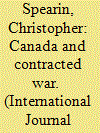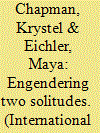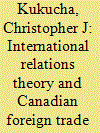|
|
|
Sort Order |
|
|
|
Items / Page
|
|
|
|
|
|
|
| Srl | Item |
| 1 |
ID:
136171


|
|
|
|
|
| Summary/Abstract |
Several scholars have begun to assess the benefits of role play simulations in the university classroom. This study provides a model to assess the effectiveness of active learning exercises on student engagement and learning. The paper describes role play simulations related to climate change negotiations run in four courses at two universities in the United States and Canada, identifies the learning outcomes, and aligns them with four knowledge domains (factual, conceptual, procedural, and metacognitive), developed from Anderson and Krathwohl's (2001) work, a revision of Bloom's (1959) taxonomy. We offer a useful assessment model, and discuss several assignments designed to assess the educational effectiveness of the simulations, and conclude by identifying additional areas for future research.
|
|
|
|
|
|
|
|
|
|
|
|
|
|
|
|
| 2 |
ID:
136445


|
|
|
|
|
| Summary/Abstract |
It is important to recognize the multifaceted, and sometimes necessary, role military and security contracting played in supporting the Canadian Armed Forces (CAF) in Afghanistan. It is also important to assess the degree to which this expeditionary experience might shape later Canadian engagement with the private sector. To do so, the paper first identifies the four key areas of CAF military and security contracting pertaining to the mission in Afghanistan: logistics and support personnel, equipment, training, and defensive security. Regarding this last form of contracting, the paper then focuses on Canadian engagement in the development of the Montreux Document and the subsequent creation of the draft National Defence Directive on the Selection and Use of Private Military and Security Contractors on Deployed Operations. Unlike other endeavours, this activism explicitly recognized Canadian reliance on contractors and the need to manage the risk associated with contracting. The paper’s final section suggests the manner in which the directive will shape future contracting decisions, especially given the growing connections between contracting for logistics, training, and defensive security.
|
|
|
|
|
|
|
|
|
|
|
|
|
|
|
|
| 3 |
ID:
135122


|
|
|
|
|
| Summary/Abstract |
Edward Snowden’s June 2013 leak has shone unprecedented light on the dark underside of Internet connectivity. So far, however, Canada has remained a victim largely hidden in the shadows.
Much of the debate over the National Security Agency (NSA) revelations has focused on U.S. domestic surveillance of individuals never under suspicion. But whatever modest legal protections Americans may enjoy, all those outside the United States are classified as foreigners and have no such protection. And while we know most about the NSA’s domestic surveillance operations, the Snowden documents make very clear that with the aid of its allies—Great Britain, Canada, Australia, and New Zealand—the NSA has developed a globe-spanning surveillance infrastructure of remarkable scale and scope. Not surprisingly, the NSA has targeted countries regarded as “unfriendly” to American interests, such as China, Russia, and Iran, but the Agency has also been intercepting and analyzing the internal communications of countries generally regarded as “friendly” allies, such as Brazil, Denmark, Germany, France, India, Italy, Netherlands, Norway, Spain, and many more. The aptly named Boundless Informant program reported that in one month alone, the NSA’s Global Access Unit collected data on over 97 billion emails and 124 billion phone calls from nearly every country.
|
|
|
|
|
|
|
|
|
|
|
|
|
|
|
|
| 4 |
ID:
134968


|
|
|
|
|
| Summary/Abstract |
A mixed perception of the Canadian contribution to the North West Europe campaign exists in the body of the literature. Some refer to the Canadian Army as the ‘Cinderella Army’ relegated after Normandy to clearing up the Channel coast, fighting with limited resources and largely unsung. This paper critically analyses the Canadian Army’s role in the campaign and considers the influences over its generation and employment from a political and military perspective. Through a comprehensive historical analysis this paper concludes that, despite political neglect, Canadian fighting power increased significantly as the campaign progressed due primarily to the experience and confidence gained by the operational level commanders. This is emphatically illustrated by a case study comparison of Operation ‘Spring’and the operations to clear the Scheldt Estuary to open the strategically important port of Antwerp.
|
|
|
|
|
|
|
|
|
|
|
|
|
|
|
|
| 5 |
ID:
134721


|
|
|
|
|
| Summary/Abstract |
Dependence on foreign oil has long been considered a national security issue in the United States. Yet imports from some countries, such as Canada, are seen as a benign form of economic interdependence that yields gains from trade for both parties. Literature on energy interdependence usually conceives of dependency as an objective material condition whose political implications can be accessed through sober cost/benefit analysis. By contrast, this article argues that dependency is best seen as a discourse and that assessments of the costs and benefits of dependency are shaped by cultural constructions of geography. A critical constructivist approach to interdependence is developed to make this case. US dependence on Middle Eastern oil serves as an example to illustrate the argument. It is argued that American representations of the Arab world as America’s principal cultural Other have precluded a liberal reading of US–Middle Eastern energy interdependence.
|
|
|
|
|
|
|
|
|
|
|
|
|
|
|
|
| 6 |
ID:
136449


|
|
|
|
|
| Summary/Abstract |
This article brings gender into the two-solitudes debate in Canadian foreign and defence policy by analyzing English- and French-Canadian newspaper coverage of women in combat in Afghanistan. We argue that there are no “two solitudes”—no national divisions are apparent between Quebec and the rest of Canada (ROC) when it comes to media representations of women in combat. Our findings confirm what other scholars have recently argued, which is that differences between the two solitudes on issues of defence policy may be less significant than often stated. The narrative of female combat soldiers presented in the media helps construct a pan-Canadian identity around the idea of Canada’s progressiveness on military gender integration. We also found that the extent to which the death of a female combat soldier received media attention was largely based on her origin from Quebec or the ROC. These differences lead us to conclude that a selective heroization of soldiers on the basis of their origins affects Canadian media coverage of the war.
|
|
|
|
|
|
|
|
|
|
|
|
|
|
|
|
| 7 |
ID:
137053


|
|
|
|
|
| Summary/Abstract |
Despite the fact that the issue of whether Canada should develop a greater foreign intelligence capability has been broached numerous times, in various guises, over more than a century, those who have followed the development of the country's intelligence architecture will know it has never had a foreign intelligence service like its close allies. They will also be aware that on each occasion on which the issue has been raised, the Canadian government has declined to proceed. If history is any guide, there is a strong likelihood that the idea of Canada developing a more robust capability will again engage politicians, former intelligence officials, academics, the media, and think tanks in the not too distant future. The view adopted in this paper is that the public discourse has become sterile, and that if it is to advance, aspects of the counterfactual case – why has a foreign Humint capability not been developed? – may prove more fruitful.
|
|
|
|
|
|
|
|
|
|
|
|
|
|
|
|
| 8 |
ID:
134664


|
|
|
|
|
| Summary/Abstract |
This study evaluates the application of international relations theory in the Canadian foreign trade policy literature. It determines that studies can now be categorized into several groups, including: traditional power-based approaches; the content and negotiation of international trade agreements; the globalization of public policy; federalism and international trade; North American integration; and alternative approaches and new directions. For the most part, however, international relations theory is applied unevenly and implicitly in studies of Canadian foreign trade policy, if at all, with an emphasis on realist and neo-liberal approaches highlighting Canada as a principal, dependent, or middle power. It is argued that a greater emphasis on international relations theory, focusing on the level-of-analysis problem, non-state actors, and normative considerations, would improve the understanding and evaluation of Canada’s global trade relations for academics and practitioners.
|
|
|
|
|
|
|
|
|
|
|
|
|
|
|
|
| 9 |
ID:
134663


|
|
|
|
|
| Summary/Abstract |
Even though they claim to recognize that the boundaries between domestic and international security have eroded, scholars of Canadian paradiplomacy have tended to ignore the security-oriented paradiplomatic activities undertaken by sub-national actors in Canada. However, policing paradiplomacy is, in our view, a perfect case for understanding how paradiplomacy in security can change the relationship between the state and its citizens. Through an examination of the paradiplomatic activities of the Royal Canadian Mounted Police, the Sûreté du Québec, and the Vancouver Police, we show how the role of the informal, the danger of mission creep, and the shaping of foreign policy from the margins work to shift how we think about where foreign policy happens.
|
|
|
|
|
|
|
|
|
|
|
|
|
|
|
|
| 10 |
ID:
134660


|
|
|
|
|
| Summary/Abstract |
This article revisits our 1993 field analysis of the theoretical condition of Canadian foreign policy (CFP) literature, which was in turn a response to Maureen Molot's 1990 argument that said literature had “been captured by its own preoccupations and ha[d], therefore, remained highly descriptive.” In our analysis, we found the field to be marked by promising yet exceptional and arrested theoretical openings and a lack of cumulation, broadly understood. We are struck today by the degree to which our core assessment still holds. In this article, we return to the arguments advanced in 1993 as the foundation for evaluating some key theoretical developments in the intervening years. We focus on the “critical turn” in CFP, the contributions of feminist scholars, and the rise of mainstream social science or “problem-solving” approaches, which we see as the most explicitly and self-consciously “theorized” approaches within the field. We conclude by looking afresh at the question of cumulation and reflecting on the fluidity of who and what constitutes the field today.
|
|
|
|
|
|
|
|
|
|
|
|
|
|
|
|
| 11 |
ID:
134809


|
|
|
|
|
| Summary/Abstract |
This article discusses the benefits and challenges of offering an onsite seminar on Canadian politics and foreign policy and assesses how this format contributes to achieving the goals of the 2011 APSA report, Teaching Political Science in the 21st Century. First, the author describes the development and requirements of the College of Liberal Arts and Sciences Global Seminar series at Iowa State University, the structure of the seminar, and its operation in Ottawa. Second, several of the pedagogical and experiential benefits, as well as the challenges, for making the seminar successful are identified and discussed. Third, by weighing these benefits and challenges, the author concludes that such a seminar has the potential to serve as an effective model for increasing an understanding of Canadian politics among American students, as well as to meet several important recommendations for improving the teaching of political science today.
|
|
|
|
|
|
|
|
|
|
|
|
|
|
|
|
| 12 |
ID:
134661


|
|
|
|
|
| Summary/Abstract |
In 2012, the Harper government launched a national celebration of the bicentennial of the War of 1812, even though few Canadians were aware of the anniversary or of the war itself. While commemorating a largely unknown war might at first seem counterintuitive, this article argues that the focus on the War of 1812 represented an opportunity to engage in the construction of a different Canadian identity. In effect, the narrative surrounding the War of 1812 celebrations permitted the Conservative government to begin to establish a new “warrior identity” in contrast to the “peacekeeping identity” that has been associated with liberal internationalism and the Liberal Party. While liberal internationalism in both the study and practice of Canadian foreign policy contributed to a national identity framed around shared internationalist values, the narratives presented during the War of 1812 celebrations suggest an alternative understanding of the “true” nature of Canadian identity.
|
|
|
|
|
|
|
|
|
|
|
|
|
|
|
|
| 13 |
ID:
134662


|
|
|
|
|
| Summary/Abstract |
In a discussion of English School approaches to international politics, Barry Buzan suggests that one should look at “how particular states and peoples encounter and adapt to international society.” This essay examines how Canadian governments through their foreign policy practices have encountered and adapted to international society. It starts from a premise that Canadian foreign policy has been integrally linked with international society since the early part of the twentieth century and that international society has done much to influence Canadian foreign policy practice through the years. In turn, this paper discusses how Canadian foreign policy, at times in a very direct and conscientious manner, contributed to the development of international society and how that contribution has changed over time. Finally, this essay argues that an English School lens can provide a constructive interpretation of the significant transition that has occurred in Canadian foreign policy over the past two decades.
|
|
|
|
|
|
|
|
|
|
|
|
|
|
|
|
|
|
|
|
|